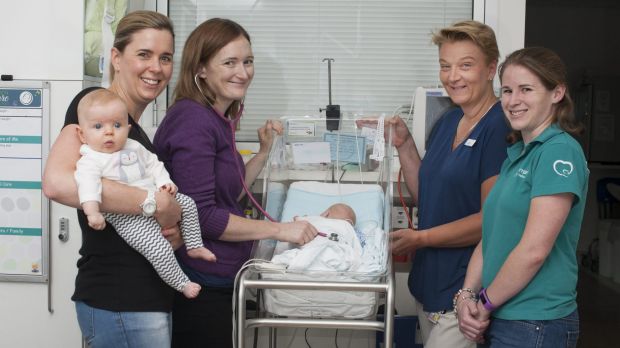
Emily O’Callahan with baby Jessica and Belinda Palmer checking her baby son Flynn Billings, Associate Professor Dr Zsuzsoka Kecskes and Corinne Henderson from Miracle Babies ACT.
Feeling helpless and relegated to simply watch on as your premature or sick baby battles to survive can be hugely traumatic for parents.
But a promising international study is under way at the Centenary Hospital for Women and Children in Canberra that considers the measurable health benefits of including parents in the hands-on care of their fragile newborns.
Associate Professor Zsuzsoka Kecskes said the hospital’s neonatal unit was one of six throughout Australia involved in the worldwide study into the tangible benefits of integrating family care.
“There are clinicians who think this [Integrated family care program] is just a ‘nice to have’ but doesn’t have any measurable benefits,” Dr Kecskes said.
“This is an international study which looks at whether there are any measurable improvements in health outcomes which for babies is things like length of stay, weight gain, breastfeeding rates, and infection rates.”
The 18 families who have taken part since the study launched six months ago have been trained and empowered by the unit to check medication, do nappy changes, tube feeds and contribute to discussions with clinicians about how their baby is faring.
Volunteers from the ACT Miracle Babies NurtureGroup are providing peer support to Canberra families involved in the integrated care study.
Miracle Babies ACT volunteer co-ordinator Corinne Henderson said since her daughter Emily was born 10 weeks premature in 2010, there had been a dramatic shift in the inclusion of parents and the level of hands-on contact parents had with their little ones.
“All our volunteers that provide support have had a premature or sick baby themselves so they get it,” she said. “It’s really great for parents to be able to chat with a person that’s been and knows what they are going through.”
Dr Kecskes said the study had potential to change the prevailing culture in neonatal intensive care units worldwide, which treats parents as “visitors”.
“I think this will change culture,” she said. “If we can prove that making the parents part of the care team rather than just visitors, and this has benefits not just for the parents but for the health of the babies, then we will see a change in the way parents are treated in the NICU.”
Changes to the level of involvement and incorporation of parents in the hospital’s neonatal intensive care unit were already being noticed.
“What we are already seeing is the affects on the neonatal unit staff,” shes said. “They are much more comfortable to include not just the study parents but other parents too.”
